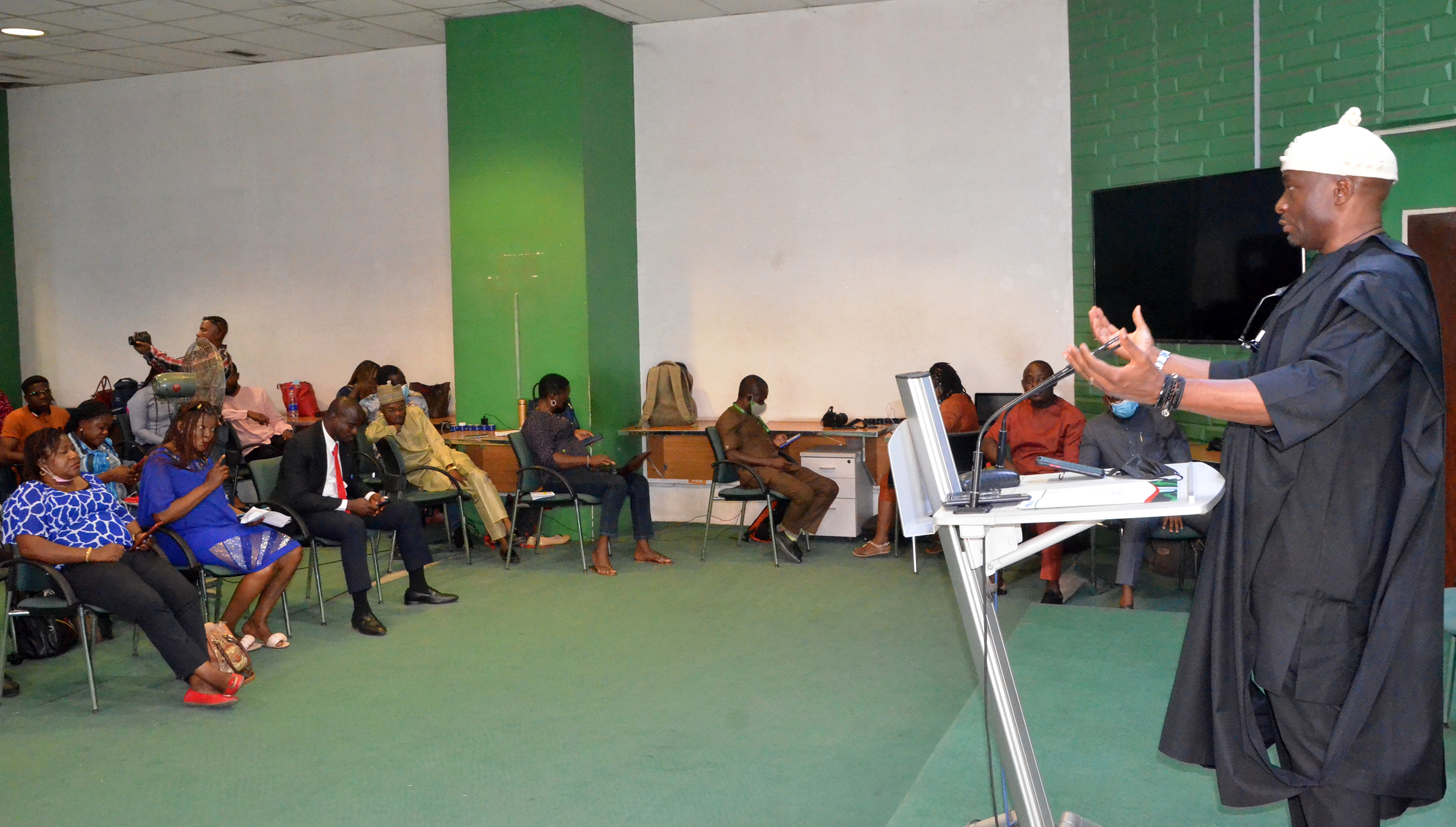Featured
CBN Targets $200bn Non-Oil Export Revenue …As Nigeria Loses N60bn Yearly To Lack Of LID

Determined to frontally address inadequate foreign exchange in the economy, the Central Bank of Nigeria (CBN) has announced an initiative named, RT200 Programme, to stimulate non-oil exports, with a $200billion FX income target in the next three to five years.
The CBN Governor, Mr. Godwin Emefiele, announced the initiative at the end of the Bankers’ Committee meeting, in Abuja, yesterday.
Under the programme, the CBN, working with the Money Deposit Banks, is to fund the construction of dedicated non-oil export terminals, to eliminate the delays currently experienced by exporters.
It would also provide loans to companies for value-addition and production of finished goods for export at 5percent for a 10-year period, with two years of moratorium.
Other key features of the programme, according to the CBN boss, included Non-Oil Commodities Expansion Facility; Non-Oil FX Rebate Scheme; and Biannual Non-Oil Export Summit.
Rather than exporting raw cocoa, with minimal export proceeds, Emefiele said that his team would fund companies to produce chocolate in-country.
He said that cashew processing, currently at a mere 5per cent of the nation’s production, as well as, sesame seeds processing would be prioritised.
Meanwhile, the Cocoa Farmers Association of Nigeria (CFAN), yesterday, said Nigeria loses N60billion annually to the non-existence of Living Income Differential (LID) for producers of the cash crop in the country.
According to the organisation, Nigeria has the potential to reclaim its position as the second largest producer of cocoa in the world and solve its foreign exchange woes through a mechanism that encourages help producers earn a living wage.
CFAN’s President, Mr. Adeola Adegoke, stated these during a workshop jointly organised in Abuja by the University of Ibadan and the Agricultural Policy Research in Africa (APRA) with the theme: ‘Cocoa Commercialisation in Nigeria: Issues, Prospects and Policy Requirements’.
He lamented that because of the global oversupply of cocoa many producers in the country receive a woefully low share of cocoa revenues; hence, live in extreme poverty.
Adegoke noted that the cocoa sectors in Ghana and Côte d’Ivoire establish fixed ‘floor’ price of cocoa annually and applies a ‘differential’ of US$400/tonne above the floor price to increase income for cocoa producers to help them achieve a living income.
He said, “In the 1960s, we were the number two highest producers of cocoa in the world. We were producing 590,000 metric tonnes and with this potential, the Western Regional Government was being run with this money.
“As of today, Ivory Coast is producing about 2.5million metric tonnes of cocoa. Ghana is producing about 800,000 – 1million tonnes of cocoa; but when you look at what Nigeria is producing side-by-side with our land resources and number of cocoa farmers that we have, it is clear, we can surpass what these two countries are producing combined. That is why, as smallholder farmers, we have been able to analyse the challenges responsible for our low productivity.
“In Ivory Coast, they produce nothing less than 800-1000kg of cocoa per hectare, but in Nigeria, it is an average of 350-400kg per hectare. This is unacceptable, because it made Nigerian cocoa farmers poorer.
“In Ghana today, each farmer collects $400 on each tonne of cocoa after the fall price. Same in Ivory Coast, and that’s why we believe that Nigeria must begin to collect Living Income Differentia (LID). The refusal to collect it makes us lose N60billion annually,” he said.
Adegoke stressed the need for the government and stakeholders to strengthen mechanisms that would increase Nigeria’s guaranteed cocoa farm gate price to encourage production.
“The indices today, especially in the last two months, show that cocoa is next to oil in terms of foreign exchange revenue in Nigeria. It means that the foreign exchange deficit we are having could be solved through the cocoa economy,” he stressed.
The Chairman, House of Representatives Committee on Agriculture Colleges, Universities and Institutions, Hon. Munir Agundi, lamented the non-implementation of the country’s cocoa policies.
“We are not going to leave policies at the ministry level anymore without being backed by the law,” he stated.
The Country Lead and Principal Investigator of APRA (Nigeria), Dr. Adeola Olajide, called for the formulation of Nigeria’s cocoa utilisation and consumption policy, adding that we must consume our own cocoa.
Featured
FG To Seize Retirees’ Property Over Unpaid Housing Loans

The Federal Government Staff Housing Loans Board says it has begun the compilation of list of retired civil servants who have defaulted on the full repayment of housing loans obtained.
Head of Information and Public Relations, FGSHLB, Mrs Ngozi Obiechina, disclosed this in a statement in Abuja, yesterday.
Obiechina quoted the Executive Secretary of the Board, Mrs Salamatu Ahmed, as saying that the move was aimed at recovering mortgaged properties from retirees who failed to meet their loan obligations.
Ahmed noted that the decision followed a recent memo issued by Mrs Patience Oyekunle, Permanent Secretary, Career Management Office, Office of the Head of the Civil Service of the Federation.
According to her, the memo reminded public servants of the mandatory requirement to obtain a Certificate of Non-Indebtedness to the FGSHLB and MDA Staff Multipurpose Cooperative Society as a precondition for retirement.
The Executive Secretary said that the board would take necessary legal steps to repossess properties where applicable, in line with the terms of the loan agreements.
She said this was in line with the provisions of the Public Service Rules 021002 (p), issued by the Office of the Head of the Civil Service of the Federation.
“I am directed to bring to your attention the provision of Public Service Rule (PSR) 021002 (p), which mandates all public servants to obtain a Certificate of Non-Indebtedness as a prerequisite for retirement.
“The Federal Government will commence the seizure of mortgaged properties belonging to retiring federal public servants who have failed to fully repay housing loans obtained from the board,” she said.
Ahmed explained that the FGSHLB reserves the legal right to repossess any mortgaged property in cases where a public servant exits service without fully repaying the loan.
She reiterated that the directive also applied to already retired officers who were still indebted.
She urged all affected public servants to regularise their loan status and obtain the required clearance certificate without delay.
“The board is currently compiling a list of such retirees, which will be forwarded to relevant regulatory agencies for debt recovery.
“The FGSHLB remains committed to enforcing compliance and ensuring proper loan recovery procedures are followed, “ she added.
Featured
FG Begins Induction For New Permanent Secretaries, Accountant-General

The Federal Government has kicked off a three-day induction programme for newly appointed Permanent Secretaries and the Accountant-General of the Federation, aimed at equipping them for strategic leadership and effective policy implementation.
The induction, according to a statement yesterday by the Director, Information and Public Relations, Federal Ministry of Information and National Orientation, Eno Olotu, which commenced on Wednesday, is being held at the National Counter Terrorism Centre in Abuja.
Speaking at the opening session, the Head of the Civil Service of the Federation, Mrs. Didi Esther Walson-Jack, congratulated the new appointees and described their roles as pivotal to governance and national development.
“Permanent Secretaries are the engine room of the government. They are critical to driving policy implementation, institutional performance, and reform across the service”, she said.
The Federal Government has kicked off a three-day induction programme for newly appointed Permanent Secretaries and the Accountant-General of the Federation, aimed at equipping them for strategic leadership and effective policy implementation.
The induction, according to a statement yesterday by the Director, Information and Public Relations, Federal Ministry of Information and National Orientation, Eno Olotu, which commenced on Wednesday, is being held at the National Counter Terrorism Centre in Abuja.
Speaking at the opening session, the Head of the Civil Service of the Federation, Mrs. Didi Esther Walson-Jack, congratulated the new appointees and described their roles as pivotal to governance and national development.
“Permanent Secretaries are the engine room of the government. They are critical to driving policy implementation, institutional performance, and reform across the service”, she said.
“The expectations are high, and the responsibility is immense. But with commitment and teamwork, we can deliver a more efficient, accountable, and citizen-centred public service.
“This final lap of FCSSIP 25 calls for urgency, accountability, and strategic focus. You must translate vision into measurable results,” she stated.
In her welcome address, the Permanent Secretary, Career Management Office, Mrs. Fatima Sugra Tabi’a Mahmood, described the programme as a strategic investment in leadership capacity and institutional effectiveness.
The sessions featured expert-led discussions, simulations, and strategic briefings facilitated by a distinguished faculty, including Engr. Suleiman Adamu, former Minister of Water Resources; Dr. Hadiza Bala Usman, Special Adviser to the President on Policy and Coordination; Mrs. Beatrice Jedy-Agba, Solicitor-General of the Federation and Permanent Secretary, Federal Ministry of Justice; Alh. Yusuf Addy, retired Federal Director; Alhaji Bukar Goni Aji, former Head of the Civil Service of the Federation; Amb. Mustapha Lawal Suleiman, Mr. Adesola Olusade, and Dr. Ifeoma Anagbogu, all retired Permanent Secretaries.
Participants include Dr. Obi Emeka Vitalis, Mrs. Fatima Sugra Tabi’a Mahmood, Mr. Danjuma Mohammed Sanusi, Mr. Olusanya Olubunmi, Dr. Keshinro Maryam Ismaila, Dr. Akujobi Chinyere Ijeoma, Dr. Umobong Emanso Okop, Dr. Isokpunwu Christopher Osaruwanmwen, Mrs. Oyekunle N. Patience, Dr. Kalba U. Danjuma, Mr. Nadungu Gagare, Mr. Onwusoro I. Maduka, Dr. Usman Salihu Aminu, Mr. Ogbodo Chinasa Nnam, Mr. Ndiomu Ebiogeh Philip, Dr. Anuma N. Ogbonnaya, Mr. Adeladan Rafiu Olaninre, and Mr. Mukhtar Yawale Muhammed, alongside the Accountant-General of the Federation, Mr. Shamseldeen Babatunde Ogunjimi.
The induction programme will feature sessions on public sector leadership, policy delivery, ethics in service, digital transformation, and performance management.
Featured
NNPCL To Undergo Forensic Audit Soon -FG

The Minister of Finance and Coordinating Minister of the Economy, Wale Edun, has announced that a forensic audit of the Nigerian National Petroleum Company Limited (NNPCL) will begin soon.
Edun revealed this at the ongoing Nigerian Investor Forum, held alongside the IMF/World Bank Spring Meetings in Washington DC.
The minister explained that the recent changes in the NNPCL management are part of a broader effort by the Federal Government to clean up and examine the company closely.
While addressing top global investors, including representatives from J.P. Morgan, Edun shared key reforms the government has introduced to revive the economy and restore investor confidence.
He told the investors that the government’s bold economic steps have laid a strong foundation to attract private investment.
He stated, “Our goal is not just to maintain this momentum, but to accelerate it. We are targeting seven per cent annual growth, and we believe the policies we have implemented have laid the groundwork to achieve this.”
Edun highlighted that President Bola Tinubu’s administration has rolled out major reforms that are already making a difference.
He added that the Nigerian economy grew by 3.84 per cent in the fourth quarter of 2024 and recorded a 3.4 per cent growth for the year.
Edun further stressed the importance of the reforms, describing them as “unprecedented,” adding that, “We said we would do it, and now we have done it. This time, we’re staying the course.”
He pointed out signs of progress such as lower budget deficits, a better trade balance, and a more stable exchange rate.
He also said that the focus is now on growing key sectors, especially agriculture.
According to Edun, agriculture is at the top of the government’s agenda, with the aim of improving food supply and increasing productivity.
“We aim to close the food supply gap, not by importing more, but by enabling domestic producers to scale and innovate,” he said.
On infrastructure, Edun revealed that the government has rolled out 90,000km of fibre optic cable to improve internet access.
He said this move is crucial for supporting young Nigerians and tech startups.
He also noted that 4,000km of roads have been offered for private sector participation, with the first 1,000km already approved for construction.
-

 News4 days ago
News4 days agounpaid salaries: Abia teachers to begin strike Thursday
-

 Education4 days ago
Education4 days agoRivers Poly Matriculates 1, 882 Fresh Students
-
News7 hours ago
Transformational Leadership Key To Military Success-COAS
-

 News4 days ago
News4 days agoIAWPA Honours Rivers NSCDC Commandant
-
Rivers17 hours ago
‘Slave Warriors’ Puts PH In News, Projects African Culture
-
Politics6 hours ago
Keyamo Hails Tinubu Over Oborevwori’s Defection To APC
-
Niger Delta4 days ago
Tompolo, N’Delta’s Distinguished Son – Oborevwori
-

 Politics4 days ago
Politics4 days agoFG Reaffirms Commitment To Enduring Democracy







